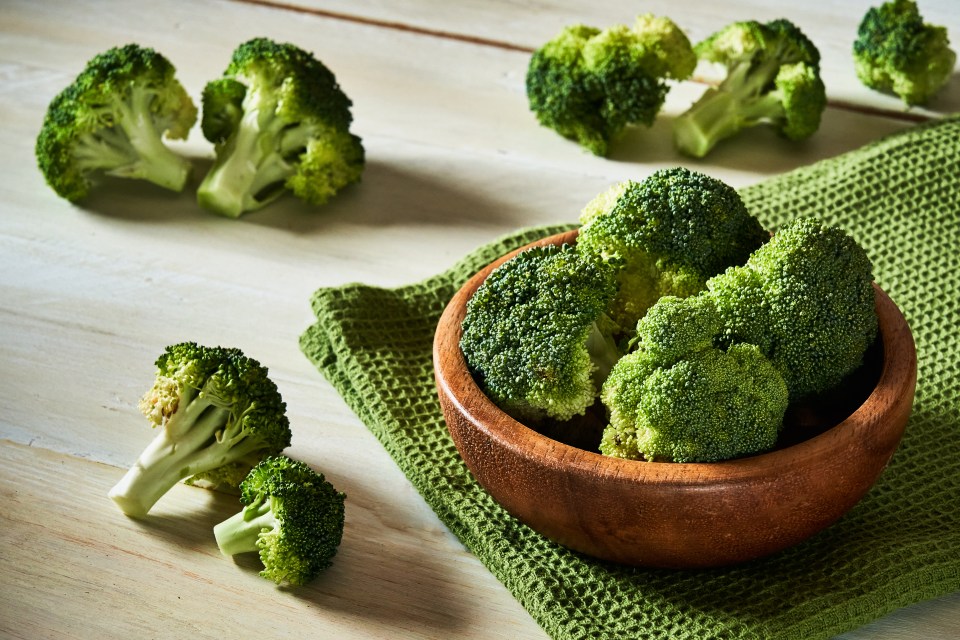A VEGETABLE that often gets pushed to the edge of a dinner plate may aid in reducing the risk of bowel cancer.
In a new study, scientists linked cruciferous vegetables like broccoli to a 20 per cent lower risk of the disease.
There are 44,000 new cases of bowel cancer diagnosed in the UK each year making it the forth most common cancer.
And with more than 16,800 deaths annually, it’s the second deadliest.
While a diet high in red and processed meat has been found to raise bowel cancer risk, researchers identified the powerful effects broccoli, cabbage, cauliflower, and Brussels sprouts can have when it comes to the disease.
The experts analysed data from more than 17 studies, comprising a total of 639,539 participants, with 97,595 cases of bowel cancer.
Read more on bowel cancer
They found including 20 to 40g of cruciferous veggies offers the best protective effect per gram.
Cruciferous vegetables are a rich source of phytochemicals, including flavonoids, fibre, vitamin C, carotenoids, and glucosinolates.
When chewed, these compounds break down into bioactive isothiocyanates, which not only give the vegetables their strong, distinct odour, but provide anticancer effects.
Isothiocyanates perform their cancer-protecting role by blocking enzymes that activate carcinogens, trigger apoptosis (programmed cell death) in malignant cells, and prevent the formation of new blood vessels at tumour sites.
The researchers analysed the data from the studies to explore the dose – whether higher vegetable intake was linked to a greater reduction in bowel cancer risk.
They found the sweet spot where the protective effect of eating the veggies started to appear was around 20g a day.
But the greatest risk reduction per gram was observed between 20 and 40g per day.
No significant improvement was seen beyond 40g per day, and the protective effect plateaued between 40 and 60g – with no additional benefits above this range.
The study also suggested geography may play a role in determining the extent of the protective effect, as it was particularly noticeable in studies from North America and Asia, but less clear in Europe and Australia.
While the study suggests a promising relationship between higher intake of cruciferous vegetables and bowel cancer, the researchers say the findings should be interpreted with caution.
Some caveats were recognised, including differences in study design and variations in dietary assessment.
Cruciferous vegetables have also been shown to prevent heart disease by lowering blood pressure and reducing atherosclerotic plaque progression through compounds like isothiocyanates and nitrates, as well as providing key vitamins and fibre.
They also inhibit vascular calcification, a key factor in heart attack and stroke risk, partly due to their high vitamin K content.
And luckily, cruciferous vegetables like broccoli are cheap too, costing just 70p.
Other ways to reduce bowel cancer risk
DIET
Increase fibre intake: Aim for three or more servings of whole grains daily and consume 22-34 grams of fibre per day, depending on sex and age. Fibre-rich foods include fruits, vegetables, beans, and whole-grain bread, cereals, and pasta.
Reduce red and processed meat: Limit consumption of red meat (beef, pork, lamb) and processed meats (bacon, sausage, deli meats).
Eat more fruits and vegetables: Include a variety of colourful fruits and vegetables in your diet daily.
Consider dairy intake: Studies suggest that dairy products, including milk, may have a protective effect against bowel cancer
Stay hydrated: Drink six to eight glasses of fluid (water or low-fat milk) daily to help fibre work effectively and prevent dehydration.
LIFESTYLE
Be physically active: Aim for at least 30 minutes of moderate-intensity exercise most days of the week.
Maintain a healthy weight: Being overweight or obese increases the risk of bowel cancer, so maintaining a healthy weight through diet and exercise is important.
Quit smoking: Smoking is linked to a higher risk of bowel cancer, so quitting is crucial for reducing your risk and improving overall health.
Limit alcohol consumption: Excessive alcohol intake is associated with an increased risk of bowel cancer, so it’s best to limit or avoid alcohol consumption.
Get screened: Participate in recommended bowel cancer screening programs, such as colonoscopies or other screening methods, to detect polyps or early-stage cancers.
Reduce sedentary time: Minimising prolonged periods of sitting can also be beneficial.
OTHER IMPORTANT FACTORS
Be aware of family history: If you have a family history of bowel cancer, talk to your doctor about your individual risk and screening recommendations.













